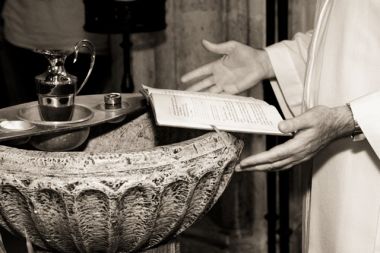Reflection: Why I favour full immersion – not sprinkling

In those days, Jesus came from Nazareth of Galilee and was baptized by John in the Jordan (Mark 1v9)
I like to think that the way I do baptisms has become a bit of a talking point in the area where I live.
I'm an Anglican, which means I baptise babies and small children. (More of that later!) But while some clergy may sprinkle just a few drops of water over a child in a way which (to my mind) is rather feeble, I like to make sure that any infant coming my way gets as thorough a soaking as decency allows.
In my smugger moments, I congratulate myself on having evolved a clever technique over the years which involves using considerable amounts of water while holding the child in such a way that none gets in its eyes. This generally keeps the baby smiling and yet at the same time creates quite a spectacle. People often comment on the sheer volume of water!
But this is not mere showmanship. While it certainly makes an impact, my primary motivation in using lots of water is theological. Indeed, it's a little known fact that, technically, the Church of England's Book of Common Prayer instructs ministers baptising a child to "dip it in the water" – albeit "discreetly and warily" – and only recommends sprinkling or pouring water if the parents can "certify that the child is weak".
So why does the Prayer Book contain this instruction – even if no-one actually dips babies today? And why do I like using lots of water anyway? The answer is simple: baptism is all about immersion – total spiritual immersion. And that takes us straight to the baptism of Jesus in the River Jordan.
Jesus, of course, had no need to be baptized. John's baptism – as Mark's gospel makes clear (1 v 4) – was "a baptism of repentance for the forgiveness of sins". And Jesus had nothing to repent of. But the reason he gets baptised is to identify himself with weak and sinful human beings such as us.
We might put it like this: Jesus immerses himself in the mess and muck of humanity in order that we might be able to immerse ourselves fully in the living presence and power of the triune God – Father, Son and Holy Spirit. And for Jesus, this reaches its climax in the cross – which he in fact describes as "a baptism to undergo" (Luke 12 v 50). On the cross, Jesus immerses himself in, identifies with and carries our sins so that the barrier between us and God might be swept away.
Now some of us will believe that baptising babies is appropriate as a statement of faith about what we are praying and trusting God will do in their lives in the future (somewhat akin as a symbol to circumcision in the Old Testament). Others of us will believe that only adults should be baptized, as a public declaration of faith.
But either way, the amazing fact is that when what baptism symbolises becomes a living reality in our hearts as we trust in Christ then we are truly immersed in him, accepted and cleansed, and God can say even of us, "You are my beloved; with you I am well pleased," (v11).
Bishop Tom Wright has written: "The whole Christian gospel could be summed up in this point: that when the living God looks at us, at every baptized and believing Christian, he says to us what he said to Jesus on that day. He sees us not, as we are in ourselves, but as we are in Jesus Christ."
Another writer, Jeremy McQuoid, leaves us with this thought to contemplate: "Do you realise that you are God's beloved son or daughter in Christ and that you are accepted and unconditionally loved by Him?"
The Rough Guide to Discipleship is a fortnightly devotional series. David Baker is a former daily newspaper journalist now working as an Anglican minister in Sussex.











